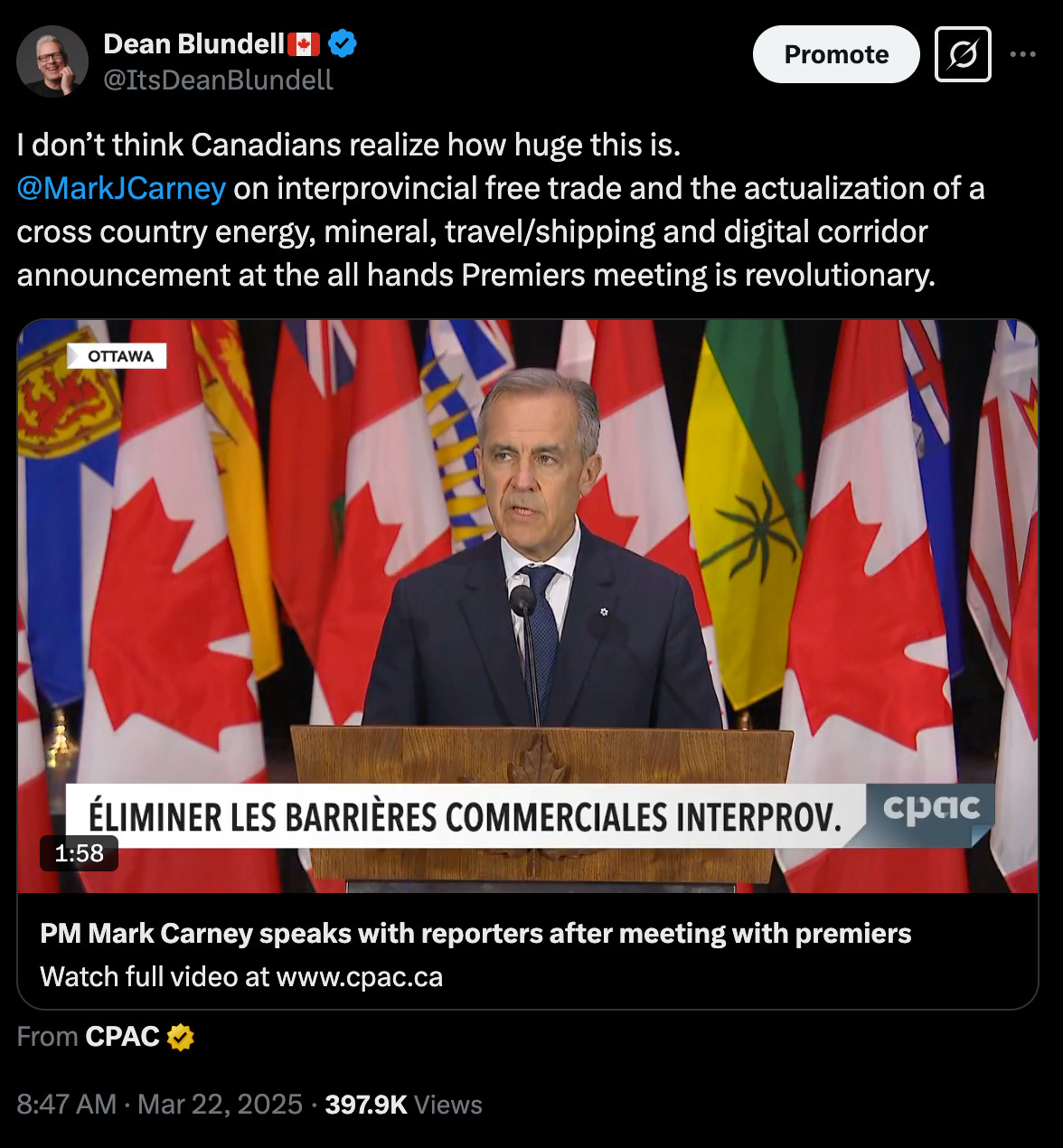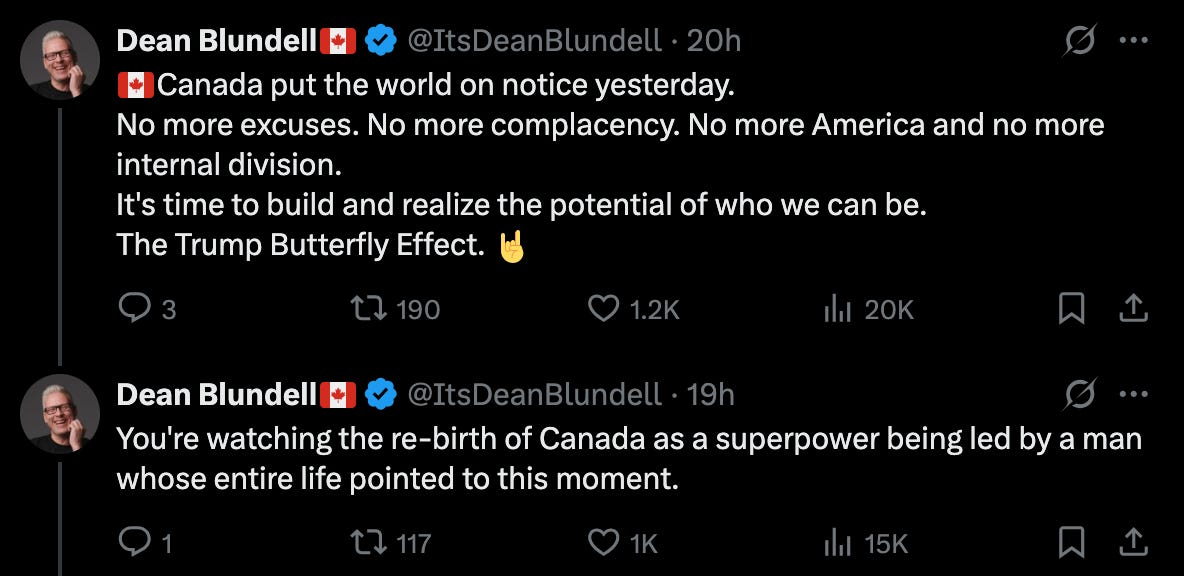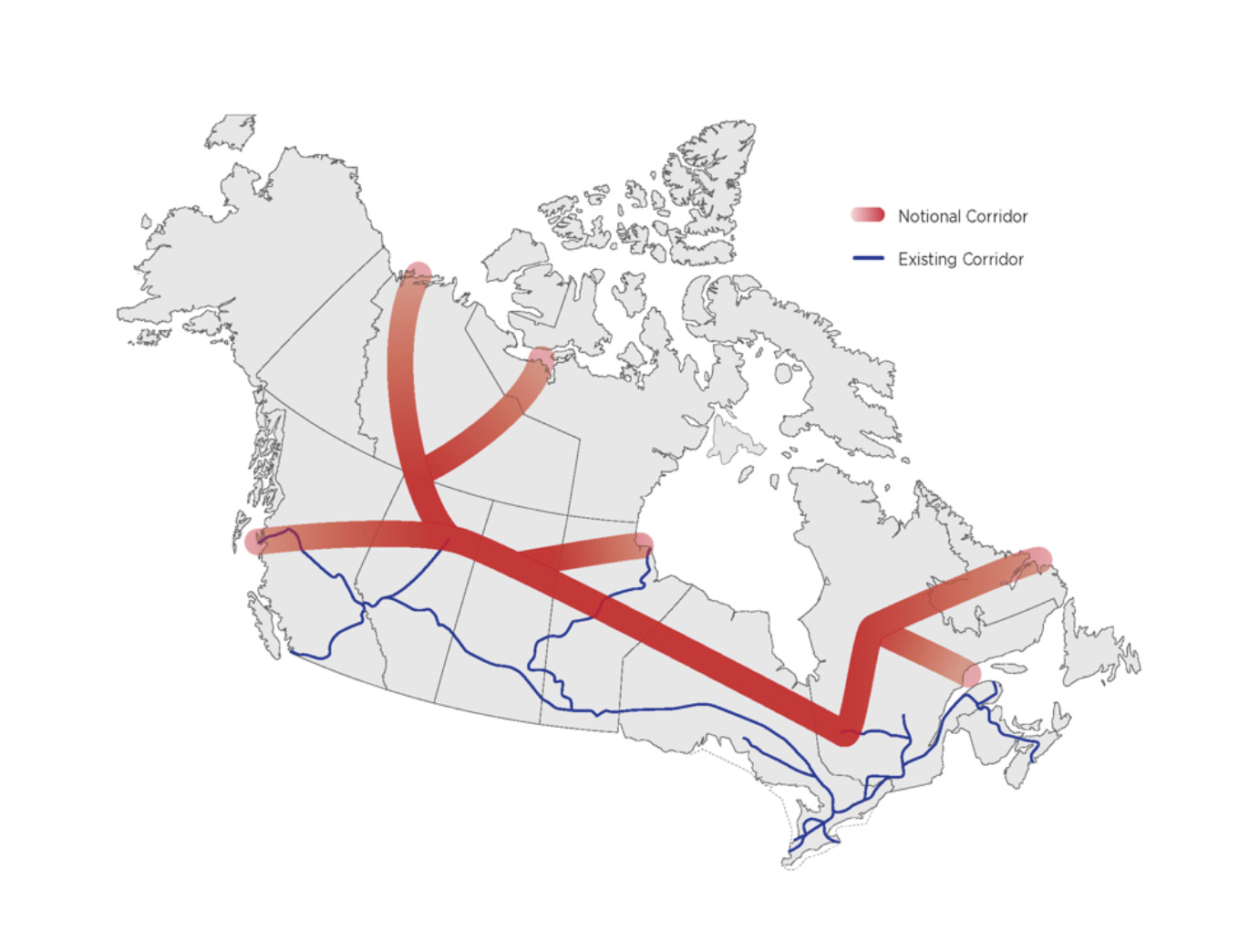Canada Just Checked Trump's Ego: Carney's Super-Corridor Sets Stage for a Global Power Shift Without America
The Maple Curtain Drops: Carney's Corridor will turn Canada into a Global Superpower as America Watches Helplessly
A Trade War Wake-Up Call 🇨🇦🔥
Donald Trump thought he could push Canada around with tariffs and threats – he overplayed his hand. Last week, Prime Minister Mark Carney met with Canada's premiers and delivered a game-changing response. "The trade war brought on by the United States" had forced Canada's hand. Instead of folding, we doubled down on ourselves. Carney vowed Canada "can more than offset the effects of any U.S. tariffs by eliminating internal trade barriers alone." In other words: screw dependence. We're tearing down walls within Canada to nullify Trump's attacks from outside.
Carney's message to Trump was blunt. "There's someone who's trying to weaken our economy. Donald Trump… We can't let him succeed, and we won't"
Those were his words as he unveiled retaliatory tariffs and a pivot away from trusting the U.S. blindly. "When we're united, we are Canada Strong," he declared – and he meant it. By trying to bully us, Trump only succeeded in awakening a sleeping giant north of the 49th. Canada's answer? Build our own path to prosperity and power, no permission from Washington needed.
The National Corridor: Canada's New Backbone
Conceptual map of a potential pan-Canadian corridor (red) connecting energy, transport, and digital infrastructure from coast to coast. Carney's masterstroke is a National Energy/Shipping/Travel/Digital Corridor, a coast-to-coast-to-Arctic strategy to unite the country like never before.
This isn't just a pipeline or a highway—it's everything. Imagine a multimodal lifeline spanning 7,000+ km—road, rail, pipelines, power lines, fiber-optic cables—all in one corridor. That's the vision. The concept has been called a "visionary project that could unlock extraordinary economic potential."
Now, it's government policy.
Carney outlined a First Mile Fund to connect remote energy sites to the grid of roads and rails. There will be no more stranded resources; if we dig it up or pump it out, we'll ship it out. A "one-window" approval process will blitz through red tape for nation-building projects while still upholding top safety and environmental standards. For once, Canada is acting with wartime urgency in peacetime—because economically, Trump declared war on us. Well, game on.
This corridor strategy is already putting runs on the board. The federal government chipped in $200 million for a new Indigenous-led LNG facility in BC, ensuring Canadian natural gas reaches global markets
pm.gc.ca. Another $175 million is reviving the rail line to the Port of Churchill on Hudson Bay – our Arctic deep-sea gateway. That investment will "expand and open new transportation corridors" and help get Canadian products to the world. In short, we're spending big to ship big. Ottawa is finally betting on Canada's own infrastructure, not U.S. goodwill.
The economic payoffs will be massive. Removing internal trade barriers (yes, those stupid rules that made it easier to trade with Texas than between Toronto and Calgary) could cut trade costs up to 15% and boost our GDP by 4–8%. We're talking hundreds of billions added to our economy just by unifying our domestic market. No wonder Carney aims for "goods to travel across the country free of federal barriers" by Canada Day. Free trade within Canada – what a concept, eh? It took Trump's economic shots to finally get us to do it. By becoming our own best customer and investor, we weaken any American chokehold. The era of Canada being the junior partner is done; we're building the backbone to stand tall on our own.
Owning the Top of the World 🌎❄️
The corridor doesn't stop at the Arctic Circle – it embraces it. Climate change is melting polar sea ice, opening up the coveted Northwest Passage for navigation. Canada isn't going to watch from the sidelines as others rush in. "Climate change is increasing access to Arctic resources and shipping lanes… heightening competition", warned Canada's Defence Minister. Damn right, it is – and Canada now plans to win that competition. By investing in Churchill and northern infrastructure, we're staking our claim as gatekeepers of an emerging superhighway of global trade.
Just how valuable are these Arctic routes? Hugely. Scientists project that summer sea routes over the pole could be 30–50% shorter than today's Suez or Panama Canal paths, cutting transit time by 2+ weeks.
That's a logistics revolution, and those who control these routes will reap the rewards. The Arctic is loaded with natural resources, too – oil, gas, critical minerals, and fish stocks – a potential goldmine as the ice recedes. No one will gift us our share of this bonanza; we either assert control or get sidelined. As one analysis put it, control over Arctic waterways and resources are "ripe for dispute and potential conflict," and a "race to build infrastructure to support and control navigation has already begun". Canada is now decisively entering that race.
The Trudeau government (before Carney took over) actually laid the groundwork with a new Arctic policy focusing on security and sovereignty. Foreign Minister Mélanie Joly said it plainly: "Continue asserting Canada's sovereignty, including over the Northwest Passage. Diplomacy and defense go hand in hand."
In other words, it's ours – period. For decades, the U.S. arrogantly insisted the Northwest Passage was international waters, brushing off our claims. Under Trump, they certainly weren't about to respect Canadian sovereignty. Fine – we'll do whatever it takes to enforce it ourselves. That means a beefed-up military presence: new Arctic patrol ships, upgraded radar and airfields, and maybe finally a functional deep-water port in Nunavut. By 2025, Canada's fleet of six Arctic Offshore Patrol Ships is operational, ready to conduct sovereignty patrols in ice up to a meter thick. We're literally arming ourselves to guard our frozen backyard.
And we're not doing it alone. In a historic turn, Canada is aligning with European Arctic allies to secure the Far North. With Finland and Sweden now in NATO, the Nordic countries are key partners in countering Russian and Chinese ambitions in the Arctic. Think tanks note that if Canada works closely with Norway, Sweden, and Finland, we can collectively deter threats and keep the Arctic peaceful – "Nordic partners will be essential… if Canada is to fulfill its ambition to put the Arctic at the center of its defense." Under Carney's watch, expect Canada to deepen military collaboration with these countries, integrate into NATO's northern strategy, and even co-develop Arctic infrastructure. This is EU-aligned security in action: trusting our European friends who share our northern worries instead of a flakey U.S. that under Trump might cut and run. We're opening new consulates in places like Nuuk, Greenland, and anchoring a strategic dialogue with Nordic states. The message is clear: the Arctic's future will be led by those who actually live there (Canada and the Nordics), not by an America that only pays attention when it wants something.
Canadian sovereignty over the Arctic is no longer a polite diplomatic note – it's a hard reality backed by ships, sensors, and steel. "Our North, Strong and Free," as the new defence policy proclaims, comes with serious investments in northern defence. We're finally putting our money (billions of it) where our mouth is. The strategic payoff? Canada will command one of the world's great emerging trade arteries. Every ship that wants to cut through our Arctic will do so on our terms – and maybe with our pilots and our ports profiting from it. That is a power move no one saw coming a few years ago, and it shifts the balance of power in North America decidedly in our favor.
New Allies, New Markets (F*** Trump)
Trump's belligerence didn't just push Canada to build internally; it pushed us to look outward to new allies and markets. We're not just talking – we're signing deals and forging bonds that sideline the U.S. from the equation. Remember, about 75% of Canada's exports traditionally went to the U.S.. That over-reliance was a strategic liability, and Trump proved it by holding our economy hostage with one tweet or executive order after another. Never again. Canada is turbocharging trade with Europe and beyond. We already have a free trade pact with the EU (CETA), but now we're leveraging it to the max and expanding links with Asia and Latin America.
Carney explicitly said he's seeking "new trade routes" with other countries – a direct shot at America-first isolation. Indeed, as soon as the tariffs hit, Canada set aside $5–6 billion to help our exporters find alternative markets and "diversify to new global markets." We're fast-tracking trade deals with any partner that isn't going to pull a Trump on us. Europe, which shares our frustration with the current U.S. regime, has become a natural partner. In February 2025, Canada and the EU reaffirmed an alliance in everything from trade to security – effectively an economic NATO to go along with the military one.
On the security side, we're syncing up with European defence initiatives, so we're not dependent on U.S. hardware or whims. If America won't lead, Canada and Europe will do it together. You can bet we'll be inviting NATO Europe to train in our Arctic and share the burden of keeping Putin and co. in check up north. We're buying European kit where it makes sense, collaborating on critical minerals (so the West isn't beholden to China), and even discussing hosting European forces on our soil for Arctic exercises. As one policy expert put it, Canada's strategic reset means "a move away from our longstanding defence and security reliance on our southern neighbour" and a focus on autonomy. Damn straight. We're building a Made-in-Canada (and Europe) security blanket. The days of waiting for Uncle Sam to save the day are over.
Economically, too, this pivot is already weakening America's grip. U.S. exporters are starting to feel the pinch. Example: border towns that once thrived on Canadian shoppers are panicking. In Plattsburgh, NY, businesses are "concerned about [the] decline in Canadian shoppers" flooding their stores. No surprise – Canadians are choosing to spend and invest at home or with friendlier countries. The U.S., instead of having preferential access to our market and resources, now has to compete like everyone else (and with a tariff disadvantage as long as Trump's trade war lasts). America first? More like America alone. Even U.S. strategic industries could take a hit – consider that our corridor will make it easier to ship Canadian oil, gas, and minerals directly overseas. That means less discount sales to U.S. buyers and more global price leverage for us. The U.S. can no longer count on hogging our exports on the cheap.
Politically, Trump's bully tactics have united Canada in a way not seen in generations. We've rediscovered our patriotic spine. Leaders across the spectrum – even the provincial premiers who normally bicker endlessly – agreed to this corridor plan as a national priority. "When we're united, we are Canada Strong," Carney said, and he's been proven right. Canadians are rallying behind the idea that we will not be anyone's 51st state or doormat. We'll trade with the U.S., sure, but on our terms as a confident nation that doesn't need them. This has profound implications for American influence. Washington has lost the automatic deference it used to enjoy from Ottawa. We're pursuing our own interests, whether that aligns with the U.S. or not. If Trump screams and shouts, so be it – Canada isn't flinching.
America's Strategic Blunder – Canada Rising
Trump wanted to "Make America Great Again," but by strong-arming Canada, he may have accomplished the opposite. He's ignited a fire under Canada to become a global energy and economic powerhouse and even a budding military force. The U.S. finds itself economically and strategically weakened as a result. American exporters are losing market share as Canada diversifies. U.S. companies and consumers face higher costs thanks to tariff crossfire (the U.S. is taking a hit, too, with its exports to Canada projected to drop ~6–9% under Trump's 25% tariffs – a self-inflicted wound). American political clout in Ottawa is at its lowest ebb in modern memory; no Canadian leader is going to risk looking like a pushover now. And perhaps most significant in the long run: the U.S. is outmaneuvered in the Arctic. While Washington was busy antagonizing allies, Canada seized the strategic high ground (or rather, high latitudes). We're building the ports, the railways, the icebreakers, and forging the alliances to dominate the top of the world. The Northwest Passage will sail under the Maple Leaf flag – and there's not a damn thing the U.S. Navy can do about it without picking a fight with a far more unified and assertive Canada.
In forcing Canada to seek self-sufficiency and new friendships, Trump undermined decades of U.S. strategic advantage. He took our loyalty for granted and now has to face the consequences: a Canada that is unapologetically independent and ambitious. We are locking down our critical supply chains, fortifying our Arctic sovereignty, and joining forces with Europe to uphold the world order that Trump is busy breaking. Canada has, in effect, outgrown the shadow of its giant neighbor. We've proven we'll never again be vulnerable to an American president's temper tantrum.
To be clear, Canada's rise is not about attacking or harming the U.S. – it's about protecting our own. But the collateral effect of our strategic pivot is that the U.S. loses some of its heft. It can no longer dictate terms to us economically or presume leadership by default. If the U.S. wants influence with Canada now, it'll have to earn it back with respect, not bully tactics. Ironically, by trying to put "America First," Trump may have ensured that Canada catapults to first-tier status in global energy, trade, and security. We're not just along for the ride in international affairs – we're driving the Zamboni now.
Bold, blunt, and confident, Canada's new strategy is already yielding dividends. Jobs and investment are flowing into our corridor project. Allies are eager to work with us. Our military is finally getting the resources to defend every inch of our land and seas. And Canadians have rediscovered a patriotic swagger – not the chest-thumping of conquest, but the quiet confidence of true sovereignty. We owe Donald Trump a thank-you card, perhaps? His ham-fisted approach did what decades of polite Canadian discourse could not: unite us with a purpose and light a fire under our leaders to future-proof this country.
So here's the rub: Canada will thrive with or without the United States. By building an internal supercorridor and embracing the Arctic frontier, we're securing our place as a global energy and economic superpower. The U.S. can either wise up and treat us as an equal partner or watch from the sidelines as we forge new paths with those who will. We're not the 51st state—we're the True North, strong and free and now, finally, unchained.
LFG, Eh?







No comments:
Post a Comment